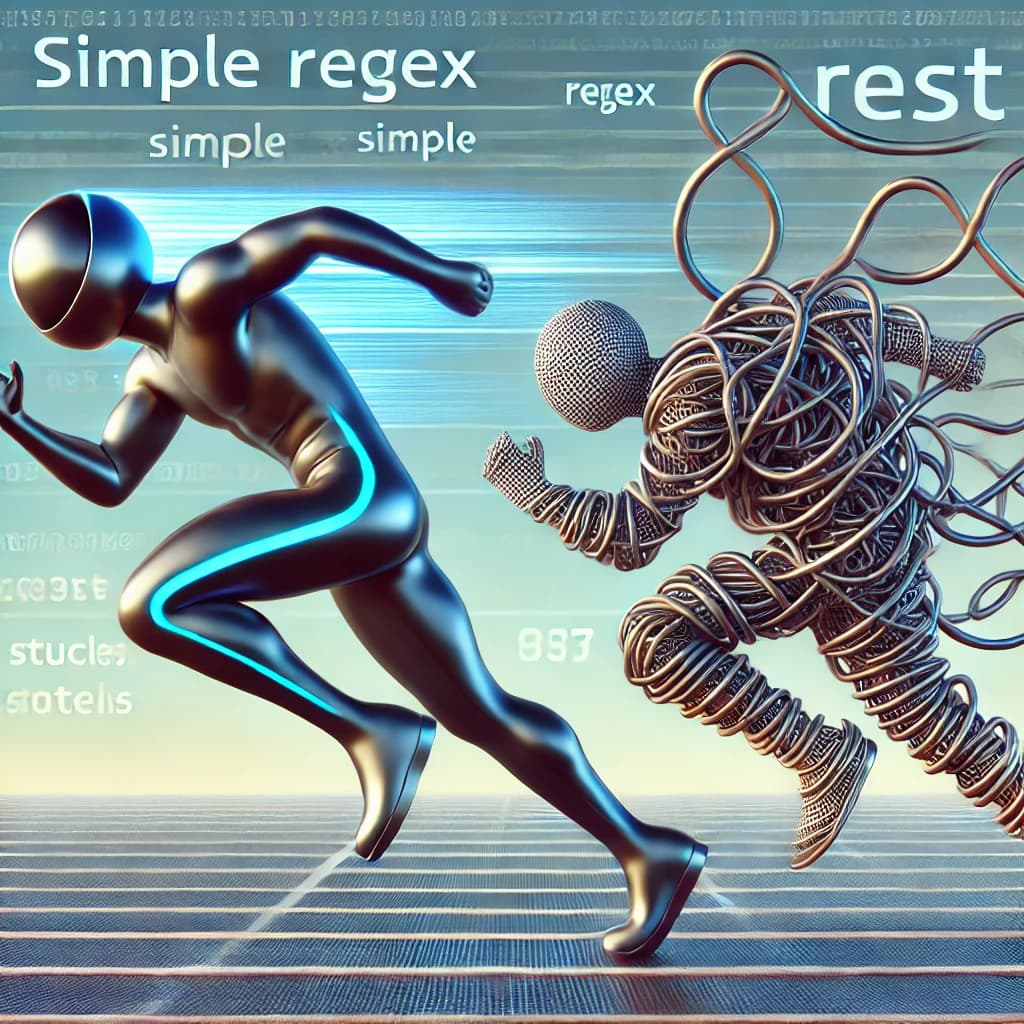
Why Regular Expressions (regex) is Slow?
February 16, 2025
Regex Performance: Unraveling the Maze of Efficient Pattern Matching
Ever found yourself staring at a spinning wheel while your regex churns through a seemingly simple string? You're not alone. Let me walk you through the wild world of regex optimization, where a tiny pattern tweak can mean the difference between instant results and watching paint dry.
The Backtracking Trap: When Regex Goes Off the Rails
Picture this: You've crafted what looks like a perfectly reasonable regex to validate user input. But when your application grinds to a halt processing a 50-character string, you realize something's terribly wrong. Let's dissect a classic culprit:
Inefficient Regex
/^(ab|a|b)*$/Time Complexity:
- O(2^n) (Exponential)
Issue:
This pattern attempts to match all possible combinations of 'ab', 'a', and 'b'. The overlapping alternatives (|) create multiple matching possibilities, leading to excessive backtracking and slow execution.
What's happening here?
This innocent-looking pattern turns into a computational nightmare with longer strings. It's like telling your regex engine, "Hey, check every possible combination of 'ab', 'a', and 'b' in every possible order... forever." The result? An explosive O(2ⁿ) time complexity that could process the entire Lord of the Rings trilogy faster than a 100-character string.
Optimized Regex
/^(ab)+$/Why this works:
By removing the ambiguous alternatives and focusing on exact sequences, we eliminate the regex equivalent of a Choose Your Own Adventure book. The engine now follows a straight path with O(n) efficiency – like switching from a maze to a highway.
Time Complexity:
- O(n) (Linear)
Improvement:
This version ensures that only valid 'ab' sequences are matched directly, eliminating unnecessary backtracking.
Real-World Speed Test
 Testing with "ababab..." (25 characters):
Testing with "ababab..." (25 characters):
- Original Regex: ~200ms (You could brew coffee)
- Optimized Version: ~0.2ms (Faster than a blink)
Pro Tips:
- Treat regex like a precision tool, not a Swiss Army knife
- When you see vertical bars (
|), hear alarm bells - Always test with
console.time()– your future self will thank you
Curious about the nitty-gritty? I've put together real benchmarks and case studies that show exactly how these patterns perform under pressure.
Under the Hood: Regex Engines Demystified
The Great Engine Showdown
Regex engines are like car engines – different models excel in different scenarios. Let's pop the hood:
What is a Regex Engine?
A regex engine processes regular expressions to match, search, replace, or split strings. It interprets patterns and applies them to text operations.
Types of Regex Engines
1. NFA (Non-deterministic Finite Automaton)
✅ How it Works: Explores multiple paths at once using backtracking.
✅ Pros: Supports complex features like lookaheads, capturing groups, and alternations.
❌ Cons: Can be slow due to excessive backtracking.
2. DFA (Deterministic Finite Automaton)
✅ How it Works: Follows a single path without backtracking.
✅ Pros: Faster for simple patterns.
❌ Cons: Limited support for advanced regex features.
Regex Engines in Popular Languages
- JavaScript, Python, Java: Use NFA-based engines (support advanced features but may suffer from backtracking).
- Go: Uses DFA-based engines (faster but lacks advanced features).
Why NFA Despite DFA’s Efficiency?
- Easier to construct from regex patterns.
- Requires less memory for complex patterns.
- More flexible for handling alternations, repetitions, and optional elements.
Web Scraping and Crawling: Traditional vs. Modern Approaches
Traditional Approach
- Uses NFA/DFA for regex-based pattern matching.
Modern Approach
- Combines AI, ML, and graph-based algorithms for intelligent crawling and data extraction.
- Examples: Puppeteer, Playwright, DeepCrawl.
Conclusion
Regex optimization is crucial for improving performance, especially when dealing with large datasets or complex patterns. By understanding the differences between NFA and DFA engines, as well as exploring modern alternatives, developers can create efficient and scalable solutions.
I've been down this rabbit hole more times than I can count. The companion GitHub repo includes my personal battle stories (and solutions) that saved projects from regex-induced meltdowns.
Next time your regex feels sluggish, ask yourself: "Am I making the engine solve a puzzle or follow a map?" The answer might just save your sanity.
Happy pattern hunting! 🕵️